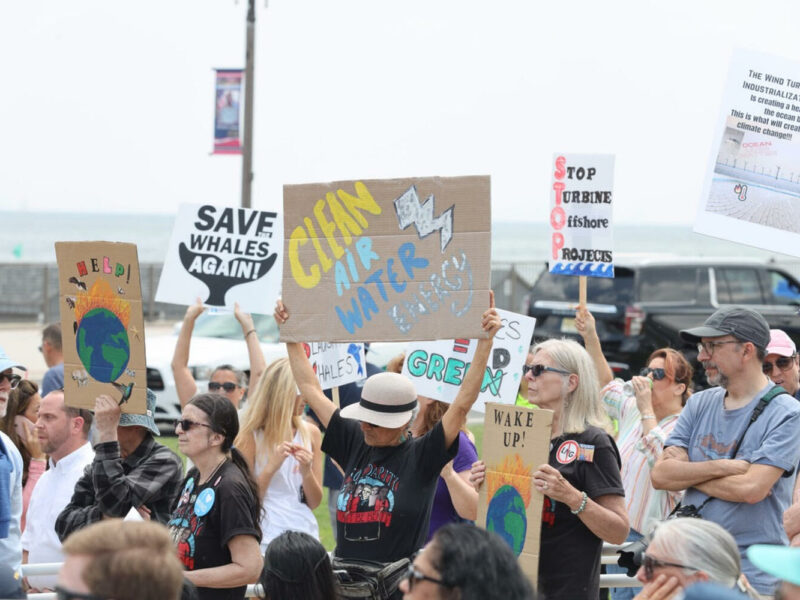

“I never understood wind. You know, I know windmills very much. They kill the birds.” — a former U.S. president
When a dead humpback whale washed up on a New Jersey beach in 2022 — allegedly because its sonar navigation was scrambled by the noise coming from an offshore wind turbine — that was very strange and sad. What was even stranger, was the fact that at the time the story broke, the wind turbine hadn’t yet been built. That, and the fact that humpback whales don’t use sonar to navigate.
Welcome to the madcap world of climate change solution denial. Where you never let the truth get in the way of a good argument. And where, with every effective solution, comes a litany of reasons it won’t work, all of which when held up to the light, don’t make much sense.
For the merry little band of naysayers protesting offshore wind and their puppet master, big oil, it makes no difference that the unusual mortality rate of marine mammals began well before offshore wind energy development. Nor that the real threats to whales today are collisions with boats, entanglements with fishing gear and warming oceans.
I, too, would be heartbroken about the beaching of a humpback whale and the hypothetical wind turbine that murdered it, if I ran a billion dollar oil conglomerate that stood to lose market share to the green economy. What self-respecting ExxonMobil CEO wouldn’t become a whale-hugging Greenpeace activist, if green energy threatened to curtail the industry’s record-breaking oil and gas profits?
Oh wait. Greenpeace, whose entire history is about putting lives on the line for whales, has been defending offshore wind and arguing that the greatest threat to the whales is climate change. This past February, Greenpeace stated that, “Protecting whales means busting fossil-fueled myths about wind energy.”
While the debate about whether climate change is real and human caused has been put to bed, at least in Eastern Suffolk County, its evil cousin, climate obfuscation, is alive and well and proving to be just as powerful a tool to stalling green energy projects.
One way that the fossil fuel industry disguises its involvement in spreading disinformation is through sham grassroots organizations, commonly known as “Astroturf” groups. Underneath the homemade cardboard signs and hand drawn dolphins, there’s nothing grassroots about them. These anti-wind organizations are funded by groups such as the Caesar Rodney Institute and The Heritage Foundation, which themselves are front groups for the American Fuel and Petrochemical Manufacturers, American Energy Alliance and oil tycoons such as the Koch Brothers.
And that the end of this supply chain of disinformation is us, the slightly confused and hopelessly overwhelmed victims of our bad newsfeeds.
I, personally, see the influence of climate activists play out in all kinds of ways, seeping into the discourse even of the most intelligent of skeptics. An old friend in Colorado has become deeply concerned about 14-year-old boys being killed in the mines in the Democratic Republic of Congo, where cobalt for Tesla batteries is now being mined.
I was perplexed by this sudden streak of empathy. As far as I’d known, she’d never been passionate about anything beyond fine dining in Aspen.
Then I understood. She was exposed to a well-promoted narrative that the creation of Electric Vehicle (EV) batteries are worse than the benefits of reducing CO2 emissions.
She would never get a Tesla, or any other EV. Period. (Good job, Koch brothers!)
True, there’s a lot to hate about mining for cobalt: armed conflicts, human rights abuses, desolated forests and species extinction. Out of context, these issues might make fossil fuel energy look relatively decent. After all, no one wants to drive around on the mineral equivalent of blood diamonds. But in an environmental cost-benefit analysis, mining is dwarfed by the overwhelming devastation caused by oil extraction. “Given the human and environmental costs of oil extraction, relying on gas cars over electric vehicles is the bigger contributor to environmental injustice,” says Stephen Porder, professor of sustainability at Brown University.
My friend was also getting a false narrative. Manufacturers now use six times less cobalt in EV batteries than in earlier models, and some have eliminated “artisanal” cobalt entirely. Last year, half of all vehicles Tesla sold contained batteries with no cobalt.
Because the most common tactic solution deniers employ is making the solution itself seem unenvironmental, it’s really important to weigh the environmental cost/benefit.
For example, wind turbines may use resources and carbon emissions to create, but in comparison, fossil fuels’ environmental footprint is almost 90 times larger than that of wind. Solar power also has a negligible footprint. According to the U.S. Energy Information Administration, switching a household’s electricity from fossil fuels to solar power reduces its annual carbon footprint by 80 percent.
In 2020, building the world’s wind turbines, solar panels, EVs and other clean-energy infrastructure demanded an estimated seven million tons of minerals. The oil, gas and coal industry, by contrast, extracted the equivalent of 15 billion tons.
Another way to measure the environmental cost-benefit of a solution is to look at its emissions payback period. Offshore wind turbines take eight months to offset their carbon cost of construction, and then offer just over 24 years of carbon free electricity.
Solar takes roughly three months to offset its carbon footprint, but then generates carbon free electricity for 25 years or more. EVs, including the production of the batteries and the emissions from charging, offset the carbon footprint of production within roughly two years of driving. The emissions payback time for EVs will only continue to drop as more wind and solar power comes onto the grid. Yue Qi, a battery researcher points out, “Every prediction made 10 years ago about the price, efficiency and energy density of batteries was too pessimistic.”
The claim that solar panels, turbine blades and EV batteries are unenvironmental because they aren’t recycled is also spurious. While only 5 percent of lithium batteries are being recycled today, green energy is too new a phenomenon to have needed large scale recycling centers. Now that large scale solar farms are finally being built, recycling centers are just now needing to ramp up. Already more than 80 percent of wind turbine components are recyclable or reusable. Redwood Materials, the largest recycling factory of used EV batteries, can recover more than 95 percent of the elements in a spent battery for new battery cells. CEO Jeffrey Straubel told the AP, “Every battery that we can recycle is one battery worth of materials that we don’t need to mine again.”
There’s a well-proven theory that if you put an idea out there often enough and long enough, it becomes believable, or at least plants a seed of doubt.
So next time you hear one of many of pernicious arguments for why green energy isn’t green, consider the source. Or the source behind the source.
When I think about the plight of the whales, there’s an old New Yorker cartoon that comes to mind. Two whales are talking. One whale says to the other, “Save us? What about them?” Good question. Let’s listen to the whales.
Terms:
Astroturf Group: Fake grassroots organization that pretends there’s popular support for the agenda of an industry, firm or political elite.
Blow Fish: Focusing on an inconsequential aspect of scientific research, blowing it out of proportion in order to distract from or cast doubt on the main conclusion of the research.
Fake Experts: Spokespeople who convey the impression of expertise on a topic while possessing little or no relevant knowledge.
Foolish: The American Petroleum Institute funneling tens of millions of dollars into advertisements that promote “cleaner fossil fuels” as a solution to curbing rising greenhouse gas emissions.
Biophilia: Innate love of life and nature.
 More Posts from Jenny Noble
More Posts from Jenny Noble